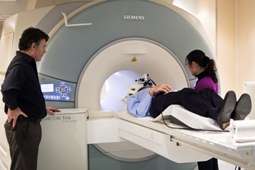What makes brains of business leaders tick

Ground-breaking research will scan the brains of influential people to explore how they make decisions, using often complex and conflicting information.
The University of Reading's John Madejski Centre for Reputation, within Henley Business School, and its Centre for Integrative Neuroscience and Neurodynamics (CINN)) are working together to examine what sets leaders apart and how they make their judgements. The research will be used to help business leaders make better decisions.
The study will look at functional systems in the brain that are associated with and support decision-making and strategic planning. The analysis will help give an understanding of how different expert groups make decisions and how these decisions are similar or different.
As part of the project an MRI scanner will be used to scan the brains of influential leaders to understand the psychological and physiological mechanisms that underpin our mental processes. The first person to be scanned is Sir John Madejski, a leading businessman in the South East. He is Chairman of Reading Football Club, as well as Chancellor of the University of Reading and Deputy Lieutenant of Berkshire.
The research is being led by Professor Douglas Saddy, Director of CINN, and Dr Kevin Money, Director of The John Madejski Centre for Reputation at Henley.
Professor Saddy said: "Psychometric and cognitive psychological tests will help reveal factors that contribute to strategic behavior. Combining these approaches will allow us to make a start on a range of outstanding questions. For example, the ability to make decisions under pressure, with incomplete, often conflicting, rapidly changing information is a key characteristic of a successful leader. How does the brain compute decisions under such conditions?
"We are only just starting to understand the neural systems that track the goals and intentions of others. We know even less about the systems that evaluate the outcomes of other people's decisions. Does information about the character and mental state of others influence our judgement of their decision-making success? Insights from neural and cognitive science will allow us to prepare and train decision-makers for situations in which it is essential to control, and allow, both cognitive and emotive assessment of information."
The initial project cohort will be business leaders but it is planned to broaden this out to include representatives of senior military ranks, police and emergency services.
Dr. Money said: "We are interested in situations and conditions where leaders may make decisions that will benefit society as well as conditions in which leaders may be in danger of making biased or self-serving decisions. This research will help us explore these and look for solutions to these problems.
"One thing we would like to explore, for example, is whether there are differences between business leaders and military leaders in how they make decisions and if there are any implications for business and military education.
"We already have some insights on how leaders balance the rights of stakeholders with risks and benefits of decision-making. In a military context this would involve an investigation of how leaders balance rights of individual citizens with the safety of larger groups. In business we would investigate how the needs and rights of multiple stakeholders are balanced with decisions to create shareholder value and financial performance.
Sir John Madejski said he was delighted to be leading the way in the innovative research. "It's going to be fascinating to see what the project reveals about not just my own thinking processes but those of other businessmen and women. Making tough decisions is part of our job but that doesn't mean we always get it right - research that can help improve our business skills is invaluable."
The study marks the start of a novel partnership between a business school and a neuroscience centre, using the strengths of both to produce innovative research.














